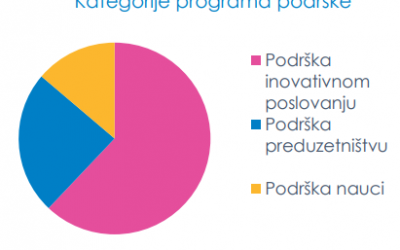Author: Ilija Stojanović – Grant Writer.
The introduction of the digital environment into the global economy marked a uniquely disruptive and impactful milestone. Less than two decades have passed between the first warning about new digital toys that have emerged to threaten the existing economic order and the general acceptance of the mainstream narrative about living in the digital age and working in the modern digital economy. It took only a few years for the world to come to terms with the fact that, whether it wanted it or not, it had irreversibly stepped into digital reality. However, acknowledging the change is one thing. Understanding the whole range of consequences and adequately responding to each one of them – is a process that can’t be put in a time frame .

Disruptiveness, inseparable from the very nature of the digital economy, has a slightly unconventional path in the context of the fundraising industry and its own digital transformation.
Although it does have a conventional one as well. Online fundraising campaigns we have today are incomparably more extensive and financially ambitious thanks to crowdfunding platforms that have digitized the industry. But the key value of digital disruption in the fundraising industry comes from another direction and is somewhat more complex.
The emergence of the digital economy , and especially the spectacular rise of tech startups, acted as the trigger for the penetration of fundraising into a for-profit economy. As we were able to learn from the nonprofit sector, gathering (financial) support for positive social change is a field where values, ideas, interests, policies and regulations overlap – with particular projects acting as operational frameworks for achieving incremental steps forward. In Serbia, the central pillar of the fundraising narrative in the nonprofit sector has always been a post-socialist transition, along with several related concepts.
Recently, thanks to the digital economy and new realities imposed by the digital environment, the for-profit economy also has its fundraising narrative.
The main pillar of this narrative is innovation . From innovation, the narrative continues through efficiency, competitiveness, profitability, economic growth, living standards, social and institutional development. Once it enters the development discourse, it becomes obvious why innovation, along with those who create it, is so interesting to regulators and policy makers.
This sudden commitment to innovation is perhaps best illustrated by the famous Horizon 2020 , the program framework designed to support the competitiveness of the European economy. Implemented in the period 2013-2020 as a mechanism for converting academic excellence into market competitiveness, it relied on innovation, its creation, commercialization and market deployment.
Horizon Europe , the successor to Horizon 2020, will bring an additional 100 billion euros into the European innovation ecosystem over the next 7 years . It will do so through the distribution of grants for scientific research projects, projects linking science and economy, the development of innovative products and services, and the strengthening of regional and cross-border innovation ecosystems.
From the perspective of fundraising and its transition towards a for-profit economy, one specific component of Horizon Europe stands out as a historical turning point.
European Innovation Council (EIC)
In the period from 2018 to 2020, the European Commission has allocated 2.7 billion euros to support high-risk innovations that will create markets of the future.
To that end, the European Innovation Council (EIC) was launched for the period 2019-2020, with a budget of around 2 billion euros. It brings together a number of existing financial instruments complemented by a number of new ones introduced by Horizon Europe. EIC is described as:
- One-stop-shop for breakthrough ideas and disruptive innovators in any field, at any time regardless of status and legal form
- Agile financing from idea to investment (Pathfinder grants for advanced research, Accelerator fund for innovative startups, private investments)
- Building ecosystems and communities through access to funding sources for mentoring and advisory services
The Widening program will also be important for innovators in our part of Europe, as it aims to connect national innovation ecosystems in the region and further with ecosystems in the EU. This orientation of the Widening program recognizes the role of a slightly different profile of stakeholders in a wider innovation arena – those who see their mission in articulating the growth and potential of innovation communities into a coherent ecosystem with strategically designed mechanisms for mutual support among its members .
It is important to stress that the EU is not the only key player whose activity has opened the doors of a for-profit economy for the fundraising industry. Small and medium enterprises (SMEs) are commonly accepted as a backbone of modern democratic societies , as they employ a critical percentage of the population and introduce the most productive segments of the global population into state-building partnerships with economic and political decision-makers. The long-term development perspective of the SME sector, especially after the global financial crisis of 2007, was unanimously recognized as a priority in the effort to preserve the competitiveness of the Western world in global economic relations.
This is reflected in the fact that the European Commission, USAID as well as agencies of other developed countries have all shown interest in financing projects aimed at increasing the innovation capacity and better access to finance for innovative companies and tech startups. Numerous projects are currently advancing towards that goal, and their implementation is increasingly entrusted to a relatively new profile of stakeholders who can demonstrate complete and well-rounded expertise, as well as notable presence in both – the consulting and fundraising industries.
This new profile of key stakeholders is often referred to as “ecosystem builders”. The most notable example of such stakeholder within the European innovation landscape would be the F6S platform, whose undisputed industry leadership, as well as success in building an innovation ecosystem can serve as an indicator of the renaissance of fundraising in the for-profit sector.
Even more importantly, the story of F6S introduces us to another category of gigantic importance within this changing role of fundraising narrative – Cascade funding.
Stay tuned…




0 Comments